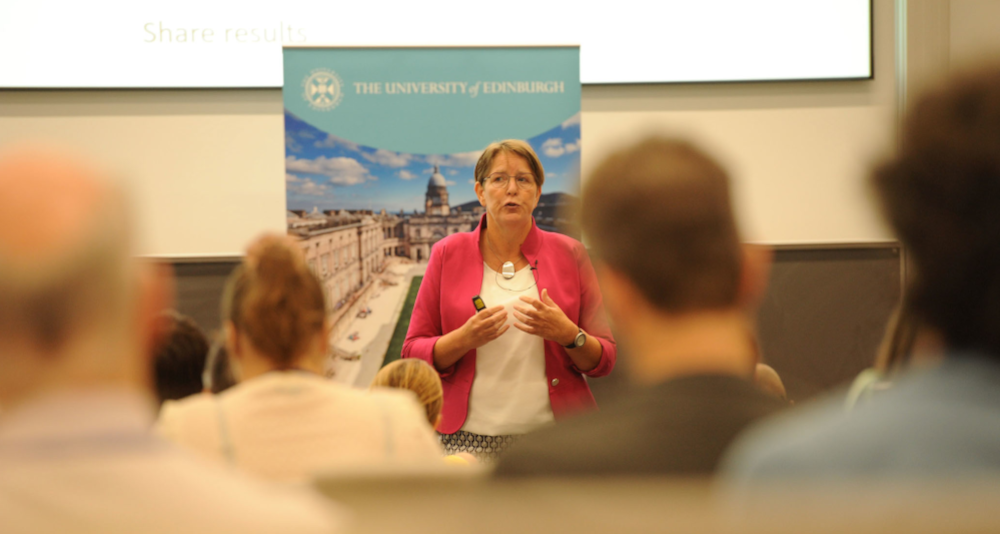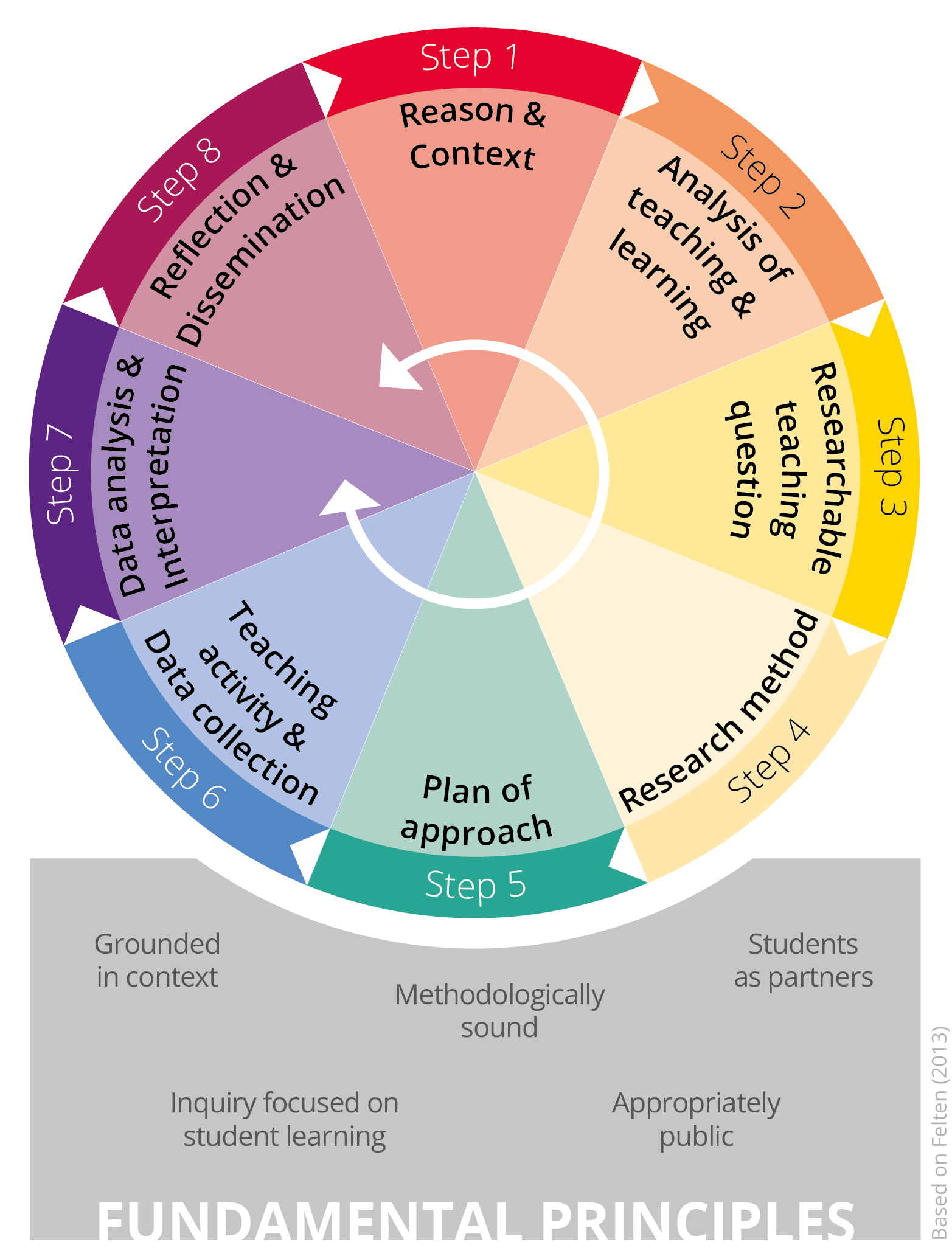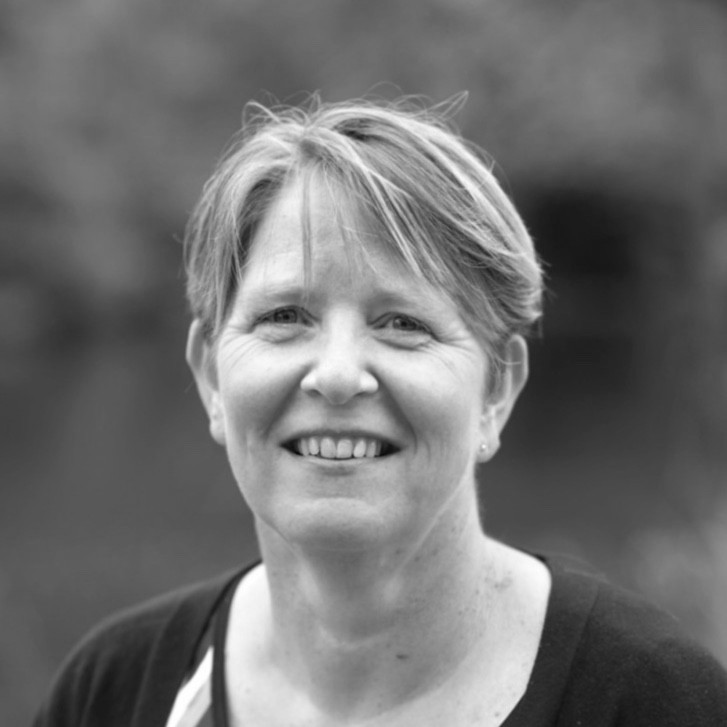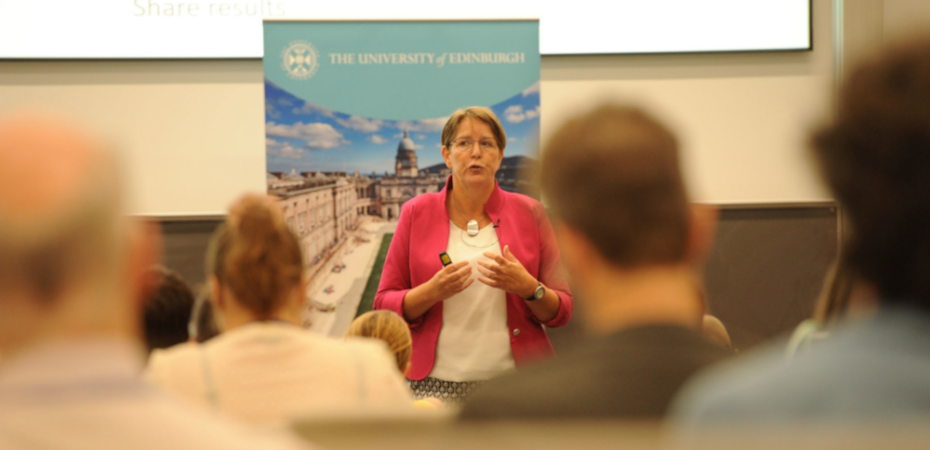
In this blog post, Dr Irma Meijerman, keynote speaker at the Learning and Teaching Conference 2023↗️, delves more into the Utrecht Roadmap for SoTL (UR-SoTL↗️) and explores how it can support us with systematically changing our teaching practice and turning our ideas into practice-oriented research. She is a Principal Fellow of the Centre for Academic Teaching and Learning at the Utrecht University↗️. This post belongs to the July-August Learning & Teaching Enhancement theme: Learning and Teaching Conference 2023↗️.
Participating in The University of Edinburgh Learning & Teaching Conference was a rewarding experience for me because it brought together passionate educators dedicated to improving student learning. The University of Edinburgh was the first university outside the Netherlands where we presented the initial ideas about the Utrecht Roadmap for Scholarship of Teaching and Learning (UR-SoTL)↗️, so it was an honour to be invited to showcase our final version of this tool during my Keynote Presentation: “Supporting inquiry into student learning: the hands-on Utrecht Roadmap for SoTL (UR-SoTL)”. In addition, one of the teachers at the University, Jessie Paterson from Veterinary Sciences, was the first native English-speaking person to give feedback on the UR-SoTL, for which we would like to thank her wholeheartedly. Naturally, being an avid enthusiast of Scottish getaways, I always relish the opportunity to visit this captivating country, and I really enjoyed wandering through the beautiful, historic city of Edinburgh.
In this blog post, I will delve more into the UR-SoTL, and explore how it can support you with systematically changing your teaching practice and turning your ideas into practice-oriented research. This systematic, evidence-informed approach of inquiry into student learning is called Scholarship of Teaching and Learning (SoTL). Additionally, I will discuss the benefits of embracing a scholarly approach to teaching and learning.
What is the UR-SoTL, and what can it do for you?
There are many different reasons that you can have to want to change something in your teaching practice. It could be difficulties in student learning, a desire to experiment with innovative IT tools, inspirational ideas or integrating new developments within your own disciplinary field.

The UR-SoTL provides a systematic, evidence-informed approach to changing your teaching practice. By following the eight steps outlined in the UR-SoTL you are encouraged to critically reflect on your teaching methods and the impact thereof on student learning. This approach not only enhances your teaching effectiveness, but it also encourages you to explore questions of interest to you, fosters a deeper understanding of teaching and learning, and improves conversations with your colleagues about education. Or, as one of the attendees at the keynote talk said: “Engaging in SoTL is fun!”
By guiding several teachers with SoTL-projects, I have experienced that implementing a SoTL-approach can be challenging, which makes perfect sense as, after all, most academic teachers are not educational scientists. When you are new to SoTL, it is can be daunting to adopt an evidence-informed approach and situate your ideas within the existing body of relevant theories and practice-based literature. Additionally, many resources on SoTL lack guidance on instructional design, which is crucial for developing effective teaching activities. The UR-SoTL addresses these issues directly, offering comprehensive support throughout the process.
Compared to other SoTL guidance resources, the UR-SoTL stands out due to its explicit support in transitioning from an initial question or problem in your teaching practice to a researchable teaching question (steps 1 to 3 of the UR-SoTL). The instructional design model, known as the “CIMO” (Context, Intervention, Mechanism, Outcomes) logic, plays a central role in the UR-SoTL. It focuses on aligning the learning context, learning interventions, learning mechanisms, and learning outcomes. These elements guide you with exploring relevant literature, understanding the mechanism of learning of your students, and designing teaching activities that lead to the desired (learning) outcomes.
I hope that you will get inspired by the UR-SoTL and that it can take away barriers that you currently feel to use a scholarly approach when you want to make changes in your teaching.
There are some practical tips I would like to give to you when you want to embark on your inspiring SoTL-journey:
-
-
- Choose a topic that ignites your passion and curiosity within your teaching practice.
- Start with a small project, such as modifying a lecture or a specific teaching activity, to gain confidence and experience.
- Collaborate with like-minded individuals who share a similar interest and engage in joint projects.
- Seek guidance from experienced resources, such as the Institute for Academic Development↗️(IAD).
- Finally, use the UR-SoTL, share it with others, and provide feedback to us so that we can further improve its effectiveness.
-
In our experience, the UR-SoTL is a valuable tool for academic teachers that seek to enhance their teaching practices through a scholarly approach. By taking advantage of the UR-SoTL, you can transform your ideas into practice-oriented research. I hope that the UR-SoTL can help you to overcome challenges in your teaching and make your SoTL-project more manageable. Embrace the UR-SoTL, explore its eight steps, and embark on your own SoTL project, empowering yourself and your students along the way. I look forward to meeting you at future SoTL-conferences, and hearing more about your projects.
More about this: Utrecht Roadmap for Scholarship of Teaching and Learning (UR-SoTL)↗️
You can watch Irma’s keynote talk ‘Supporting inquiry into student learning: the hands-on Utrecht Roadmap for SoTL (UR-SoTL)↗️‘ in the video below:
 Irma Meijerman
Irma Meijerman
Dr Irma Meijerman is a Principal Fellow of the Centre for Academic Teaching and Learning at Utrecht University. She has a particular interest in the professional development of teachers in higher education, and educational scholarship. Irma has been involved in initiating several initiatives for SoTL at Utrecht University (UU). She is a co-author of the Utrecht Roadmap for Scholarship of Teaching and Learning (UR-SoTL)↗️ a free available, tool for everyone who want to professionalize as a teacher and optimize their own teaching practice. From July 1, 2022 Irma Meijerman has been appointed as Vice-President Europe of the International Society of Scholarship of Teaching and Learning (ISSoTL). She also has a senior fellowship of the HEA and is Principal Fellow of the Centre for Academic Teaching and Learning from Utrecht University. Irma’s background is in toxicology and research in the area of cell- and molecular biology, pharmacokinetics, and oncolytic drugs. At the moment she is fully appointed as Associate Professor at the Faculty of Science, Department of Pharmaceutical Sciences.


